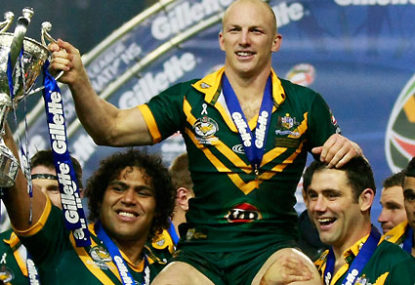Fogarty off with suspected bicep tear as Raiders night goes from bad to worse in Broncos blowout
It had all been going so well. Canberra were by far the better side for ten minutes, with Jamal Fogarty giving the Brisbane back…

The latest thing in rugby league these days, besides retirees wetting their whistle again in the Auckland nines, is the newfound craze of co-captains within NRL clubs.
With the Brisbane Broncos (Justin Hodges and Corey Parker) and the Canterbury Bulldogs (Michael Ennis and Frank Pritchard) jumping on the band-wagon this season, over a quarter of the NRL will utilise the dual captaincy form in 2014.
Being the captain of your club is a huge honour and the word should not be thrown around lightly.
Being the leader of your team meant that you were the man that guided his men into battle, you were the inspirer, you were orchestrator, you were the man to lift when the team needed you the most.
But now, when the going gets tough and the game is in the balance and that moment comes when the troops are looking for that extra bit of firepower and motivation from their Leonidas, Spartan King, they realise that the “co-captain” standing next to them is just the guy that helps out with the media.
Frank Pritchard said to the Sydney Morning Herald, after being announced as co-captain for the bulldogs for the 2014 season, “That’s my agreement with Mick (Michael Ennis): he can do the media and I’ll do the other stuff,” then continued, “If we are both on the field, I’ll probably let Mick do all the talking – I’ll just be in the background.”
So what exactly is Pritchard’s role as co-captain? Is he just a lead-by-example captain?
Dealing with the media is a big part in today’s game and the pressure for a captain to be able to perform on the field and also handle all off-field commitments is a big ask, but you can’t put a metaphorical ‘C’ on some guys jersey just to relieve the pressure off another.
It raises the question, where have all the real captains gone?
A captain is a man like Clive Churchill, a genius on the field and a gentleman off the field.
He was not only electrifying with the ball, he was courageous with and without it, never afraid to stand up to bigger men.
He inspired his team and also had the wit to lead his men around the park as a captain, and a coach for that matter.
Then you have the modern general, Darren Lockyer. Locky captained Brisbane, Queensland and Australia and did it with poise and a certain authority and respect that could not be emulated by another.
He was able to influence and ignite his team on the field, by barking commands at his men and lifting his own game.
He also had his own way of dealing with the media, giving them everything they need, without letting it affect his on-field performance.
The idea of having two guys skipper a club with different qualities is a benefit, and by giving the title to some blokes can really help lift their game to the next level, but why has the NRL seemingly forgotten about the supporting role of vice-captain.
A vice captain can handle all on-field matters when the captain is not on the pitch and can also embed his unique qualities into his teammates, developing their respect as the captain’s deputy.
The media and fans also have the same respect and understand if it is a vice captain showing up to post-game interviews or community projects.
So why have NRL clubs decided to go down this path? Is it because there is a lack of real leaders in the current game?
Do we lack players that are the complete package, men that have been grown and bred to lead their teams into NRL war and conquer?